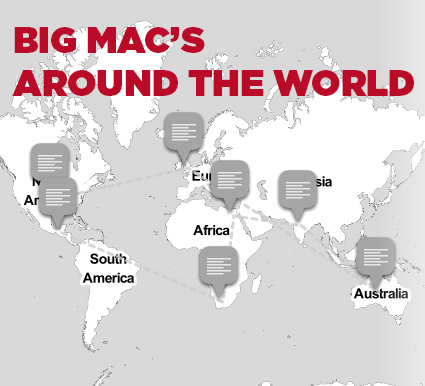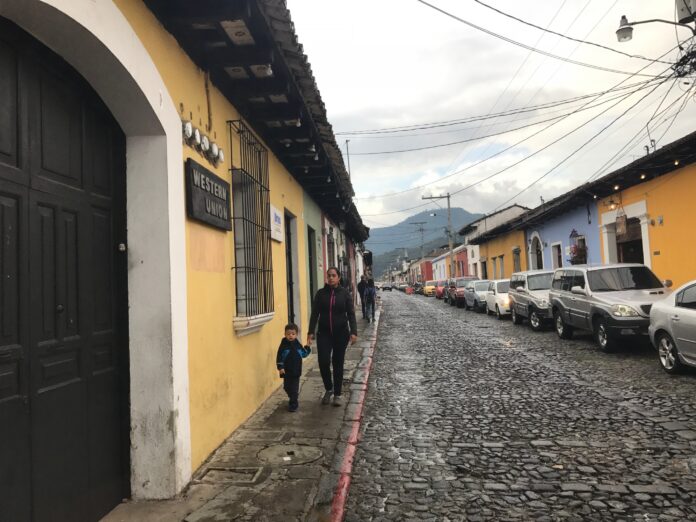
Western franchises reinforce the global north’s supremacy, with overpriced fare that many in the post-colonial world cannot afford.
I was in a van with 10 other students, not knowing what to expect of a country ravaged by colonialism, civil war and gang violence. All we knew is that we were famished, and every delicious-smelling food cart we saw was calling our names. With our faces pressed up against the windows, we were shocked to see a McDonald’s. Then a Taco Bell. By the time we passed a Burger King, we were already numb to the number of U.S. fast-food restaurants lining the streets.
Turns out, this is a longtime phenomenon. All over the global South, foreign fast food companies have set down roots, aiming for customers. Western franchises reinforce the global North’s supremacy, with overpriced fare that many in the post-colonial world cannot afford. Cuisine colonialism perpetuates the colonizer/colonized narrative, by having an outsider, in this case a U.S. franchise, influence a country socially. Often a franchise will open in a country where the majority of the population lives below the poverty line, but the franchise continues to cater to the wealthier population. For example, a McDonald’s lunch for a family of four in Guatemala costs more than what many families will earn in a week or, in rural areas, in a month.
Bolivian President Evo Morales expanded on this subject, telling the researcher Jessica Naudziunas:
“The major multinational food companies seek to control the production of food and to dominate global markets by imposing their customs and foods. The only goal of such producers is to generate profits. So they standardize food and drinks, turning them into global foods produced on a massive scale with the same formula. They are not interested in the health of human beings, only in their earnings and corporate profits.”
It is hard to fathom that in Antigua, a UNESCO World Heritage site and Guatemala’s first colonial capital, one can buy a Big Mac meal. Though globalization may have positive qualities, such as creating career opportunities and global cooperation, Western fast food chains are also engaging in cuisine colonialism. Many times, as we left churches and ruins filled with history, we were bombarded with the sights, sounds and smells of Western companies. Though many of these companies do offer certain traditional foods to attract locals, they are still a foreign brand. McDonald’s in Guatemala does have a traditional breakfast offering — scrambled eggs, tortillas, beans, plantains and cheese — its brand is still imprinted on everything it sells.
Guatemala has been a victim for decades of U.S. companies taking advantage of its resources. In 1954, the United States sponsored a coup against Guatemala’s democratically-elected president, Jacobo Arbenz. Earlier, Arbenz attempted to implement agrarian reforms, and to create a middle class, through a fairer distribution of national resources. At the time, the Boston-based United Fruit Company (now Del Monte) owned 72% of all the arable land in Guatemala. Arbenz attempted to purchase the land from the company at the same price the company had claimed on its tax returns that the land was worth. But, because the company had been undervaluing the land for years, to lower its tax bill, the administrators were outraged that a “Banana Republic” president would attempt to exert autonomy. United Fruit’s top administrators then convinced close friends in Washington at the New York Times and Washington Post that Arbenz was a “communist,“ even though it was known that Arbenz was a democratic socialist who very much admired the United States and wanted to make Guatemala like it, in terms of developing a broad middle class and high level of civil rights. This is the version reported in Bitter Fruit, a famous investigative 1982 book by Stephen Schlesinger and Stephen Kinzer. The fervor of the Cold War pushed the United States to sponsor a coup to oust Arbenz. A 36-year civil war and genocide followed, along with a seemingly never-ending cycle of violence that endures to this day. This was the result of U.S. companies working in Guatemala, exploiting the country’s resources for their ends.
Today’s U.S. fast food companies have not caused the same level of destruction United Fruit did. But they’ve perpetuated a Western superiority ideal in place since colonial times. Moreover, this has promoted and normalized diets filled with excessive fat, salt, and sugar as being “desirable” and “modern” — which is having a profound effect on rapidly growing levels of obesity, diabetes and heart disease throughout the developing world where U.S. fast food chains are “colonizing.” U.S. franchises are also taking over food landscapes, not only with their hamburgers, but by dominating the fast food restaurant landscape. The Western names, foods and most importantly, prices, create a hegemonic structure in which the West is conveniently on the side of privilege. It’s clear that the goal is not to have everyone eating U.S. fast food, but rather to appeal to the small wealthier minorities and convince everyone else that the West is the standard of wealth and “success.”
McDonald’s isn’t known for its culinary mastery; what draws restaurant-goers from developing countries is its Western appeal. McDonald’s has the same sort of appeal in South Africa, Egypt, India and many other overexploited countries. The hegemonic structure of U.S. fast food is perpetuated through its prices. As seen in the chart below, one Big Mac Meal can equal .12%-.45% of an average family’s income in their respective countries.
Fast food franchises are able to open in the global South because of their perceived cultural supremacy, thereby creating a successful market. Colonialism established the perceived idea of Western hegemony, which still infects the global South culturally. Fast food just perpetuates the idea, through its prices and its representation of Western norms and ideals.
McDonald’s has dominated the world, not through the quality of its cuisine but through Western domination — which much of the world now seems to accept.

